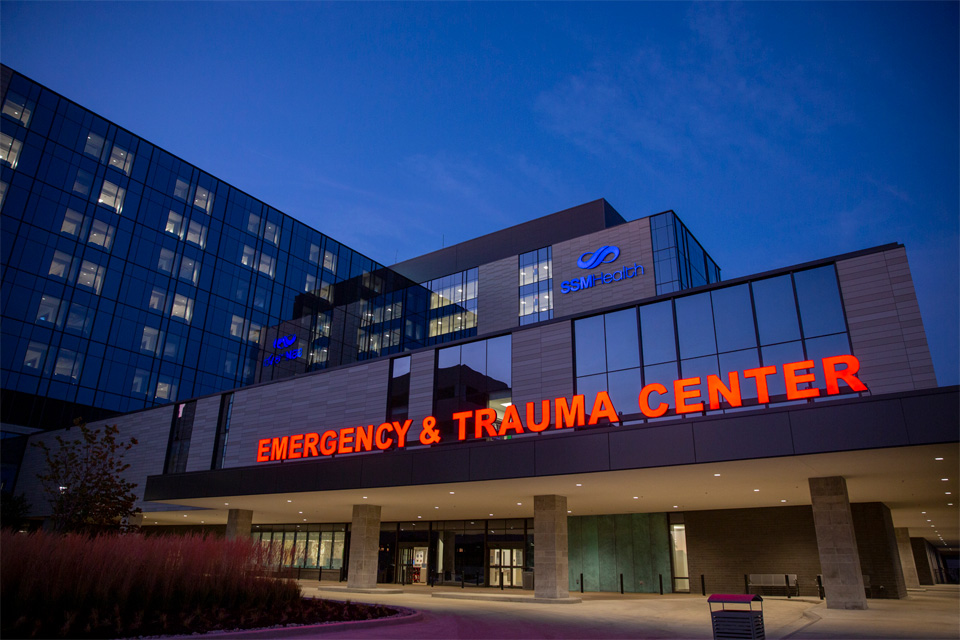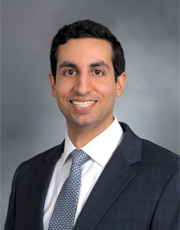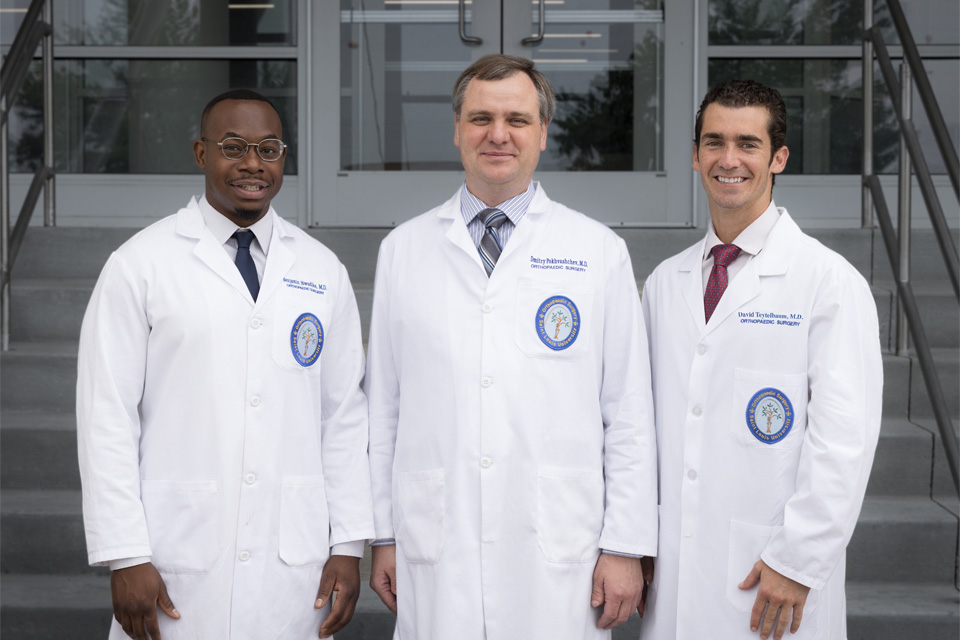Saint Louis University’s orthopaedic traumatology fellowship offers a diverse experience incorporating five full-time SLU traumatologists all with designated areas of interest and expertise.
Trauma Service at SSM Health Saint Louis University Hospital

The trauma service at SSM Health Saint Louis Hospital has a chief resident, senior and junior residents, and varying numbers of medical students from SLU. Additionally, a trauma nurse practitioner and clinical trauma nurse help manage the service.
An American College of Surgeons designated Level 1 trauma center for Missouri and Illinois, the hospital also sees the largest number of patients of any trauma center in Missouri.
Fellowship Overview
SLU’s orthopaedic traumatology fellowship is accredited by the Orthopaedic Trauma Association and participates in the orthopaedic trauma SF match for the selection of candidates.
An optional active pediatric trauma, microvascular hand service and adult reconstruction experience is also available if the fellow has an interest but not required.
Role of the Fellow
Fellows assume a crucial role in the management of patients at SSM Health Saint Louis University Hospital and help coordinate the trauma service in conjunction with the chief residents on the service. Daily census ranges between 35 and 45 patients with two-to-three orthopaedic trauma operating rooms every day so the number of cases to choose from is substantial.
There is no assigned fellow service. Fellows can select the cases that they feel will benefit their interests and future goals. This is a surgical fellowship and fellows are expected to take full advantage of all the operative opportunities afforded. One fellow is selected per year so cases are not divided amongst multiple fellows.
During the day, the fellow is scrubbed as the operating surgeon with the faculty scrubbed as the first assistant and providing direct supervision. For more subspecialized, complex trauma or reconstruction cases, the attending will be the primary surgeon with the fellow as the first assistant (or primary surgeon depending on the skill level).
Fellows are free to pick the most appropriate case throughout the day and is not tied to a particular staff surgeon. If necessary or available, fellows may be asked to staff a routine trauma case if additional rooms become available during the day (e.g., washout, ankle fracture, femoral nail, etc.) but not in lieu of a primary trauma case of interest to the fellow.
Our trauma fellows are expected to be able to actively teach residents basic tenets of trauma care, the evaluation and management of trauma patients and operative principles of long bone fracture fixation.
Current Fellow

Michael Doany, M.D.
Medical School: New York Medical College
Residency: State University of New York - Stony Brook University Hospital
Fellowship Statistics
- Total number of emergency room orthopaedic trauma admissions for the combined institutions for the 2020-2021 academic year: 2,907 admissions.
- Total operative procedures performed by the orthopaedic trauma service during 2020-2021: 1,802 procedures.
The most recent case numbers for 2020-2021 are as follows:
- Pelvic and Acetabular surgery: 176 cases
- Humerus and Elbow: 87 cases
- Tibial plateau: 72 cases
- Leg and Ankle: 349 cases
- Foot and Toes: 46 cases
- Femoral shaft fractures: 104
- Proximal femur and peritrochanteric fractures: 72
- Nonunions: 37
- Ring fixators:: 20
- Spanning ex-fix: 59, Open fractures: 79
Average fellow case logs range from 650-800 cases per year
In addition to the large numbers of acute polytrauma and monotrauma patients treated, a large volume of post-traumatic reconstruction surgery is performed including Ilizarov reconstruction for nonunions, malunions, post-traumatic osteomyelitis, leg length discrepancy, and hip related osteotomies.
Call Responsibilities
There is no call for the first month, supervised call for the second month and then the call is under monitored supervision beginning the third month of the fellowship.
After the second month, the fellow will take independent night call as an attending on the trauma service with full operative privileges. There is always a backup faculty member on call if the fellow has questions or problems and fellows can call the faculty in at any time deemed necessary. Call averages approximately five to seven times per month depending on trauma staff schedules.
Research Opportunities
In addition to the vast clinical experience offered in the course of this fellowship, there are many basic science research opportunities in the areas of fracture biomechanics and orthobiologics. Our biomechanics and cellular biology labs are staffed by full-time Ph.D.s and their master’s and doctoral candidates. The labs are dedicated to collaborative orthopaedic research projects.
Career Opportunities
Our previous fellows have obtained a wide variety of positions, including academic traumatologists running trauma services at the Naval Medical Center in San Diego, State University New York in Buffalo, Louisiana State University in New Orleans, University of Colorado in Denver and University of Missouri- Springfield.
Other previous fellows are heading Level One or Two trauma services for large orthopaedic groups practicing in community-based institutions nationwide.
